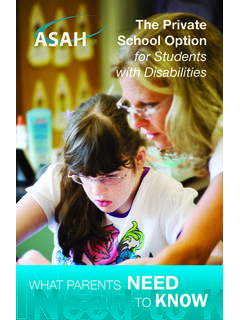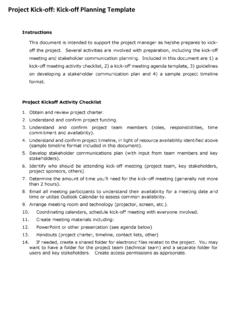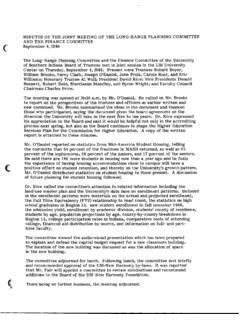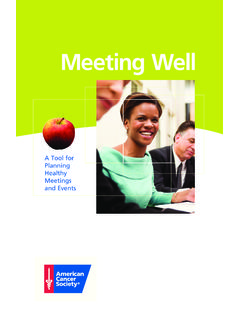Transcription of Planning the Transition from School to Adult Life - …
1 By Ira M. Fingles, Esq.,Herbert D. Hinkle Esq.,and Dorothy Van HornPlanning the Transitionfrom School to Adult Life Considerationsfor Studentswith Disabilities1 Considerations for Students with DisabilitiesCongratulations!Reading this booklet means that you have already started the process of Planning for the you have a student (or you are a student) in high School , chances are pretty good that you are now asking: What will happen after graduation? This is a difficult question for anyone, but for students in special education, it may be even more difficult. That is why federal law requires Transition Planning for all students with is proud of every graduate. Research has shown that graduates of ASAH s private special education programs in New Jersey go on to college, jobs and other fulfilling Adult roles. We are pleased to present this booklet, written in conjunction with attorneys whose practice is dedicated to disability law, to help parents and students navigate this important time in their School Thiers,Executive Director, ASAH2 Planning the Transition from School to Adult LifeAbout ASAHASAH is a not-for-profit organization of private schools and agencies in New Jersey.
2 Its members provide highly specialized services to more than ten thousand infants, children and young adults with disabilities. Founded in 1974 by thirteen private schools, ASAH now serves more than 125 School locations. It developed the first code of ethics and standards for New Jersey s private special education programs and works closely with the New Jersey Department of Education to keep it current. ASAH continues to advocate for legislative and regulatory changes that will improve the quality of life for individuals with disabilities and their families. Many of ASAH s private School members provide consultative services to public School districts to assist students with Transition Planning and is a member of the National Association of Private Special Education Centers, NAPSEC, in Washington, for Promising FuturesASAH2125 Route 33, Lexington SquareHamilton Square, NJ 08690phone: (609) 890-1400; fax: (609) for Students with DisabilitiesTable of ContentsIntroduction.
3 1 What is Transition ? ..1 When Does Transition Planning Begin? ..5 When Do Transition Services Begin? ..5 What is in the Statement of Needed Transition Services? ..6 Who is Involved in the Process? ..7 What is the Role of the Student? ..7 Areas for Transition Planning ..8 The Role of Outside Agencies ..10 Guardianship ..11 Graduation ..11 Considerations for Students Who Plan to Go to College .. 12 Strategies for Transition Planning ..15 Resources for Transition ..17 About the Authors ..19 About Hinkle, Fingles & Prior ..204 Planning the Transition from School to Adult LifeIntroduction The Individuals with Disabilities Education Act (IDEA) is the 30-year old federal law that guarantees students with disabilities the right to a free, appropriate education. For every student eligible for services under IDEA, the local School district must develop and implement an Individualized Education Plan (IEP) describing the unique set of services and supports needed.
4 For some students, that includes services from a private School at no cost to IDEA was reauthorized in 1997, Congress put a major focus on improving Adult outcomes. In 2004, the purpose of the Act was further expanded to ensure that students with disabilities have access to special education and related services designed to prepare them for employment and independent living. Transition Planning is important because it provides a framework for identifying long-range goals and the services and strategies that will help students as they make the shift from School to Adult life. What is Transition ?Under federal law, the term Transition services means a coordinated set of activities for a student, designed within a results-oriented process, that promotes movement from School to post- School activities, including post-secondary education, vocational education, integrated employment (including supported employment), continuing and Adult education, Adult services, independent living, or community must be based on the student s needs, taking into account his/her strengths, preferences, and interests.
5 It includes instruction, related services, community experiences, the development of employment and other post- School Adult living objectives, and, when appropriate, acquisition of daily living skills and functional vocational evaluation. 5 Considerations for Students with DisabilitiesWhen does Transition Planning begin? Every student who is eligible for special education under IDEA must have an IEP that describes annual goals and details the services and supports needed to meet those goals. By the time student is 14, the IEP must reflect the student s post- School at age 14 (or younger), the IEP must include a statement of Transition service needs. This describes the course of study that will lead to graduation. It also allows the IEP team to consider other educational experiences in the School or in the community that can help the student achieve his/her desired post- School goals or outcomes (college, employment, military, technical training, independent living).
6 This statement must be based on the student s needs, preferences and goals and be reviewed every year as part of the IEP process. (see page 8)When must Transition services begin?Beginning in the School year in which the student turns 16, the IEP must include a statement of needed Transition services. This describes the coordinated set of activities and strategies that will lead to the desired post- School outcomes and identifies those responsible for providing them. The statement of needed Transition services is much broader than the statement of Transition service needs (required at age 14), but both are necessary components of Transition Planning required by law. Taken together, these two steps help ensure that a student is able to achieve long-term goals and is effectively linked to supports, services and programs needed for Adult the Transition from School to Adult LifeWhat strategies and activities must be included in the statement of needed Transition services?
7 Instruction can take place in a classroom, small group or one-to-one learning. It can be provided in public schools, private schools, at home, or in the community. Related Services may include transportation, speech, occupational therapy, physical therapy and other supportive services necessary for a student to benefi t from special education. Community Experiences may be provided in communities by schools, consultants, private providers or other agencies. Employment / Other Post- School Adult Living Objectives may lead to a paid job or career opportunity, or other important Adult activities. Daily Living Skills are the types of activities most adults do every day at home and in the community. Functional Vocational Evaluation provides information about job or career interests, aptitude and skills. If the IEP team, including the student and the parents, agrees that services in one or more of the areas above is not needed, the IEP must state so and provide a rationale.
8 Community-based InstructionCommunity-based Instruction can be a very important part of a Transition IEP. It involves learning by doing. The student receives life skills, social skills, or work instruction at a community site ( , supermarket, library, bus stop, offi ce) with either one-on-one support or in a small group. The instruction is designed to teach functional skills of everyday life through hands on experiences. Goals such as learning to shop, learning to use public transportation, ordering food in a restaurant, making change, or using a map may best be learned through community-based instruction.!7 Considerations for Students with DisabilitiesWho is involved in Transition Planning ?The case manager at the local School district is responsible for the Transition Planning process, but many individuals should come together to form a team to help the student plan for Transition .
9 In addition to the student and his or her family, other members include special education and general education teachers, related service providers, administrators, and others. Some schools have Transition specialists who may be well informed about resources and Adult services in the from agencies that provide post-high- School services should be involved, including the Division of Vocational Rehabilitation Services , The Department of Human Services Division of Mental Health and Hospitals or the Division of Developmental Disabilities, and the Social Security Administration. (see page 14)Others community leaders, potential employers and provider agencies may serve as one-time or ongoing consultants to the team, sharing expertise or insight to help the team plan and make decisions. What is the role of the student in Transition Planning ?
10 Students with disabilities, age 14 and older, must be invited to participate in Transition Planning . If the student does not attend the meeting when Transition is being discussed, the School district must take other steps to ensure that his/her preferences and interests are considered. Self-Advocacy SkillsTeaching self-advocacy skills and helping the student describe the supports he/she needs to be successful are important to the Transition process. It may be useful for the student to learn about laws protecting people with disabilities from discrimination, such as the Americans with Disabilities Act (ADA) and Section 504 of the Rehabilitation Act. !8 Planning the Transition from School to Adult Life Four-year college or university Community college Trade School Private School Adult vocational/technical schoolPost Secondary Education Vocational evaluation Career assessment Specialized Transition assessments Community-based job exploration Community-based job sampling Shared time at vocational/technical School Paid work experiences Apprenticeships Part-time employment in chosen fi eld prior to graduationCareer Exploration and Development Math (budget, money management skills) Reading (identifi cation and comprehension) Writing (fi lling out forms, signing checks, writing resumes)






